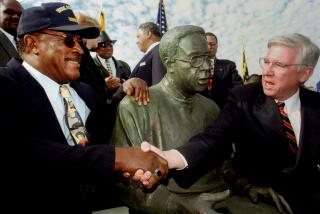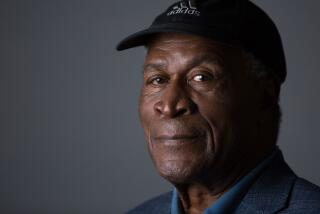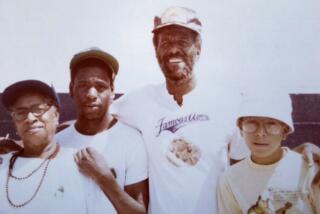A Will of Iron : Amos Left His Wife the Oxen, the Cows and a Mandate to Remain Unmarried
WE ARE sometimes assured by cynics that life was never any simpler than it is today, that there were never any good old days and that life without the technology of the 20th Century was pure drudgery.
I am sometimes filled with wonder at our cleverness when I find myself talking on the phone to London; but, as we are sometimes reminded in Western movies, there was a grandeur in the great unbroken plains and big skies of the early 19th Century, and there was a poetry in the written word that has been eliminated by the computer and the telephone.
So Susanne Johnson LeVonian was deeply gratified on finding a window into that unhurried and bucolic past recently while doing some family research in Kentucky.
She discovered a will written by her great-great-great-grandfather in 1838. âIt not only transports us to a simpler time,â she writes, âa time almost beyond belief in these hectic days--but it also evokes a poignant sense of a man facing his end but determined to have his way. . . .â
The heart of this document reads: âIn the name of God Amen. I, Amos Richardson, being sound in mind . . . I do will and bequeath to my loved wife, Frances, all my home farm and that part of my barren outfield that lies on the left-hand side of the old peach orchard and well. . . . One yoke of oxen known by the name of Buck and Jack, three milk cows known by the name of Cleverny, Whiteback and Susanâs heifer, all my sheep . . . two breeding sows, one known by the name of Chinea Black. . . . Also, 225 dozen bundles of oates, also the three stacks of hay that is now in stack. Also one stack of flax which is now rated and standing in my meadow.â
One can almost see Amos Richardsonâs spread. The barren outfield, the old peach orchard, the well, the bundles of oats, the stacks of hay, and the stack of flax in the meadow.
As LeVonian says, âIs there a more poetic phrase than âAnd one stack of flax . . . standing in my meadowâ?â
As humble as his estate may seem by todayâs standards of prosperity, Amos Richardson evidently was covetous enough of his belongings that he took care that they should not fall into the wrong hands.
He decreed that all his property and possessions, including the affectionately named livestock, were to be inherited and used by his wife as long as she remained a widow. But if she remarried, everything was to be sold and the proceeds were to be divided among his dozen children.
Also, he stated: âIt is my will that Thomas Richardson, my half-brother that now lives with me, at my death should take the young filly as his own property that he now claims and get another home.â
As LeVonian comments, âAmos obviously did not want his half-brother and widow living under the same roof!â
Nor did he want his widow to share his hard-earned estate with another husband. Thus did Amos Richardson hope to control his wifeâs fate from beyond the grave.
LeVonian adds that her great-great-great-grandfather also bequeathed $15 each to his two youngest daughters, to be given to them, with accrued interest, when they married or turned 21, whichever came first. That, evidently, was to be their dowry. I wonder what kind of a breadwinner $15 plus interest would have attracted. Alas, we do not know what happened to those daughters.
Neither do we know whether Amosâ wife gave up her wealth, including Buck and Jack, Cleverny, Whiteback, Susanâs heifer and Chinea Black, and all the land and stacks of hay and flax, to run off with some young buck who came a-courting. Evidently, Amos expected that his wifeâs wealth would more than compensate her for a loveless future, and, he calculated, no doubt, that without her wealth she would not be that attractive to a suitor.
The wife Amos named in his will was at least his second. How like a man that he did not want her to know the joys and comforts of a second spouse, as he had.
âAmos lived until 1840--two years after his will was made,â LeVonian says. âI do not know if his wife remarried.â
I hope she rode off on that filly with her brother-in-law.
More to Read
Sign up for The Wild
Weâll help you find the best places to hike, bike and run, as well as the perfect silent spots for meditation and yoga.
You may occasionally receive promotional content from the Los Angeles Times.






